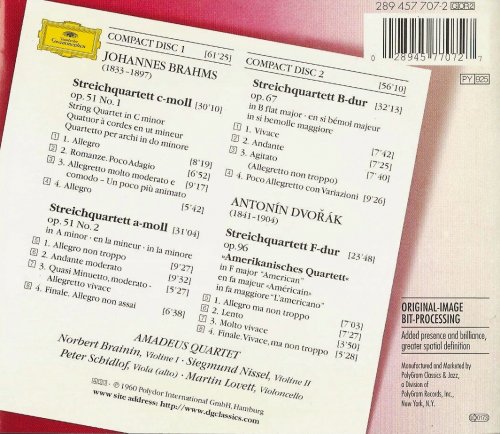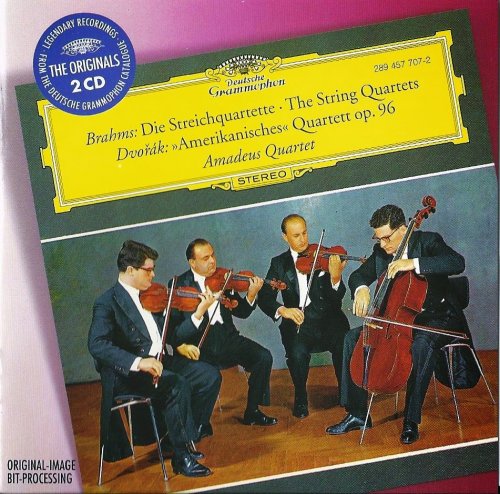
Amadeus Quartet - Brahms: String Quartets / Dvořák: 'American' Quartet (1998)
BAND/ARTIST: Amadeus Quartet
- Title: Brahms: String Quartets / Dvořák: 'American' Quartet
- Year Of Release: 1998
- Label: Deutsche Grammophon
- Genre: Classical
- Quality: FLAC (image+.cue,log,scans)
- Total Time: 01:57:35
- Total Size: 669 Mb
- WebSite: Album Preview
Tracklist:
CD 1
Johannes Brahms (1833-1897):
Die Streichquartett c-moll Op. 51 No. 1
1. 1. Allegro 8:19
2. 2. Romanze. Poco Adagio 6:52
3. 3. Allegretto Molto Moderato E Comodo - Un Poco Più Animato 9:17
4. 4. Allegro 5:53
Die Streichquartett a-moll, Op. 51 No. 2
5. 1. Allegro Non Troppo 9:27
6. 2. Andante Moderato 9:32
7. 3. Quasi Minuetto, Moderato - Allegretto Vivace 5:27
8. 4. Finale. Allegro Non Assai 6:38
CD 2
Johannes Brahms (1833-1897):
Die Streichquartett B-dur Op. 67
1. 1. Vivace 7:42
2. 2. Andante 7:25
3. 3. Agitato (Allegretto Non Troppo) 7:40
4. 4. Poco Allegretto Con Variazioni 9:35
Antonín Dvořák (1841904):
Streichquartett F-dur Op. 96 «Americanisches Quartett»
5. 1. Allegro Ma Non Troppo 7:03
6. 2. Lento 7:27
7. 3. Molto Vivace 3:50
8. 4. Finale. Vivace, Ma Non Troppo 5:28
Performers:
Amadeus Quartet

CD 1
Johannes Brahms (1833-1897):
Die Streichquartett c-moll Op. 51 No. 1
1. 1. Allegro 8:19
2. 2. Romanze. Poco Adagio 6:52
3. 3. Allegretto Molto Moderato E Comodo - Un Poco Più Animato 9:17
4. 4. Allegro 5:53
Die Streichquartett a-moll, Op. 51 No. 2
5. 1. Allegro Non Troppo 9:27
6. 2. Andante Moderato 9:32
7. 3. Quasi Minuetto, Moderato - Allegretto Vivace 5:27
8. 4. Finale. Allegro Non Assai 6:38
CD 2
Johannes Brahms (1833-1897):
Die Streichquartett B-dur Op. 67
1. 1. Vivace 7:42
2. 2. Andante 7:25
3. 3. Agitato (Allegretto Non Troppo) 7:40
4. 4. Poco Allegretto Con Variazioni 9:35
Antonín Dvořák (1841904):
Streichquartett F-dur Op. 96 «Americanisches Quartett»
5. 1. Allegro Ma Non Troppo 7:03
6. 2. Lento 7:27
7. 3. Molto Vivace 3:50
8. 4. Finale. Vivace, Ma Non Troppo 5:28
Performers:
Amadeus Quartet
There is no Amadeus Quartet any more, so this reissue is welcome for that reason alone. At the outset I ought to say that they omit the first movement repeats in all four works. This is a matter of indifference to me, but some may wish to read no further.
Apart from the historical significance of this set, I needed a cd successor to my revered Allegri LP of the opus 51 quartets, and the Allegri version does not seem to be currently available. I would have been surprised if there had been a clear-cut issue of merit between two such eminent ensembles, and as I expected the merits are finely balanced. The Amadeus seem to me to have the edge in the C minor, the Allegri remain more to my liking in the A minor. Where the Amadeus score in the C minor is mainly in the extraordinary third movement. With the exposition repeat omitted in the first movement, this is actually the longest movement of the four. It is a particularly difficult movement to bring off sucessfully. The two simultaneous melodies at the outset are the biggest test. For me they should be almost equally prominent, with a very slight bias in favour of the upper theme. The tempo is hard to judge too, and the slower Amadeus speed gets it right for me. I also need to hear a twanging quality to the tone of the accompaniment in the trio section, much as the Amadeus do it, and they round the movement off with cleaner ensemble on the final pizzicato chord. There is less to choose in the other movements, but again I got more emotional kick out of the Amadeus in the celestial Romanze, particularly the climactic phrase of the main melody, with its clear reminiscence of the same point in the Cavatina of Beethoven's opus 130. Neither gets the last ounce of eloquence out of it - in my ideal performance it has me gripping the sides of my chair - but it has been many years since I heard it done to my complete satisfaction.
In the A minor the Amadeus could have done with taking the first and second movements, particularly the second, a little faster. The Allegri are somewhere near perfect for me in these. The `andante moderato' needs to be taken at a fairly brisk walking pace to make the maximum effect, and incidentally to show how it inspired the middle movement of Elgar's quartet, and I hope someday to see a cd reissue of the Claremont performance of that. In the B flat quartet the Amadeus are excellent without erasing my recollections of a superlative version by the Budapest Quartet that I no longer own. There is an obvious suggestion of Haydn in the first movement that everyone seems to have noticed, and an equally obvious suggestion of Mendelssohn in the second that nobody seems to talk about, and I hear both clearly in this account. The last movement gives me a slight problem that I sometimes have with the Amadeus - the phrasing, particularly Brainin's phrasing, is a bit affected. With artists of this eminence one often has to take stylistic features not completely to one's liking as part of the whole deal. Dvorak's opus 96 is a work about which I am less than passionate. It is very well done indeed, I compared it with my other cd version by the Moyzes group, and I found little or nothing to choose.
The liner note by John Warrack exasperated me by its conventional and, I believe, wrong-headed thinking. As usual, we are told about some supposed influence of Beethoven in the first movement of the C minor. Part of Brahms's complex mental and musical makeup was a fondness for playing subtle little games with reminiscences of his predecessors, all a feature of his conscious role as the custodian of the great German musical tradition. However the influence of Beethoven generally on him was far less than that of Bach or Schubert, the influence of Beethoven on this particular movement seems to me to be precisely nil, and overall I believe that anyone who tries to listen to Brahms with ears attuned to Beethoven will never understand him at all. He was a different musical animal entirely. The re-engineered recording is very good in its way, but for me it has a slightly artificial effect. 5 stars? Just about. At this level of interpretation one can afford to be finicky, and there is going to be nothing more now from the Amadeus.
Apart from the historical significance of this set, I needed a cd successor to my revered Allegri LP of the opus 51 quartets, and the Allegri version does not seem to be currently available. I would have been surprised if there had been a clear-cut issue of merit between two such eminent ensembles, and as I expected the merits are finely balanced. The Amadeus seem to me to have the edge in the C minor, the Allegri remain more to my liking in the A minor. Where the Amadeus score in the C minor is mainly in the extraordinary third movement. With the exposition repeat omitted in the first movement, this is actually the longest movement of the four. It is a particularly difficult movement to bring off sucessfully. The two simultaneous melodies at the outset are the biggest test. For me they should be almost equally prominent, with a very slight bias in favour of the upper theme. The tempo is hard to judge too, and the slower Amadeus speed gets it right for me. I also need to hear a twanging quality to the tone of the accompaniment in the trio section, much as the Amadeus do it, and they round the movement off with cleaner ensemble on the final pizzicato chord. There is less to choose in the other movements, but again I got more emotional kick out of the Amadeus in the celestial Romanze, particularly the climactic phrase of the main melody, with its clear reminiscence of the same point in the Cavatina of Beethoven's opus 130. Neither gets the last ounce of eloquence out of it - in my ideal performance it has me gripping the sides of my chair - but it has been many years since I heard it done to my complete satisfaction.
In the A minor the Amadeus could have done with taking the first and second movements, particularly the second, a little faster. The Allegri are somewhere near perfect for me in these. The `andante moderato' needs to be taken at a fairly brisk walking pace to make the maximum effect, and incidentally to show how it inspired the middle movement of Elgar's quartet, and I hope someday to see a cd reissue of the Claremont performance of that. In the B flat quartet the Amadeus are excellent without erasing my recollections of a superlative version by the Budapest Quartet that I no longer own. There is an obvious suggestion of Haydn in the first movement that everyone seems to have noticed, and an equally obvious suggestion of Mendelssohn in the second that nobody seems to talk about, and I hear both clearly in this account. The last movement gives me a slight problem that I sometimes have with the Amadeus - the phrasing, particularly Brainin's phrasing, is a bit affected. With artists of this eminence one often has to take stylistic features not completely to one's liking as part of the whole deal. Dvorak's opus 96 is a work about which I am less than passionate. It is very well done indeed, I compared it with my other cd version by the Moyzes group, and I found little or nothing to choose.
The liner note by John Warrack exasperated me by its conventional and, I believe, wrong-headed thinking. As usual, we are told about some supposed influence of Beethoven in the first movement of the C minor. Part of Brahms's complex mental and musical makeup was a fondness for playing subtle little games with reminiscences of his predecessors, all a feature of his conscious role as the custodian of the great German musical tradition. However the influence of Beethoven generally on him was far less than that of Bach or Schubert, the influence of Beethoven on this particular movement seems to me to be precisely nil, and overall I believe that anyone who tries to listen to Brahms with ears attuned to Beethoven will never understand him at all. He was a different musical animal entirely. The re-engineered recording is very good in its way, but for me it has a slightly artificial effect. 5 stars? Just about. At this level of interpretation one can afford to be finicky, and there is going to be nothing more now from the Amadeus.

Classical | FLAC / APE | CD-Rip
As a ISRA.CLOUD's PREMIUM member you will have the following benefits:
- Unlimited high speed downloads
- Download directly without waiting time
- Unlimited parallel downloads
- Support for download accelerators
- No advertising
- Resume broken downloads


